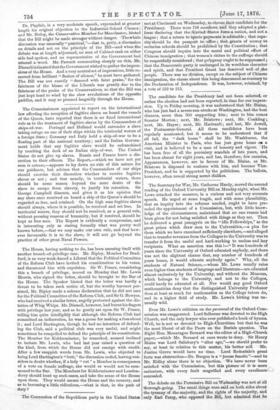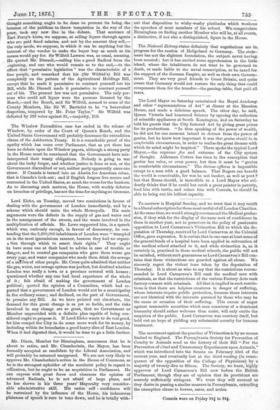The debate on the Permissive Bill on Wednesday was not
at all thorough-going. The usual things were said on both sides about the tyranny of the majority, and the rights of the majority, and only Earl Percy, who opposed the Bill, but admitted that he thought something ought to be done to prevent its being the interest of the publican to throw temptation in the way of the poor, took any new line in the debate. That sentence of Earl Percy's hints, we suppose, at selling liquor through agents who are paid fixed salaries, and not by the amount they sell,— the only mode, we suppose, in which it can be anything but the interest of the vendor to make the buyer buy as much as his means would pay for. Sir Wilfrid Lawson was, as usual, amusing. He quoted Mr. Disraeli,—calling him a good Radical from the aeginning, and one who would remain so to the end,—to the effect that "permissive legislation" was the characteristic of a free people, and remarked that his (Sir Wilfrid's) Bill was completely on the pattern of the Agricultural Holdings Bill, except that he made it permissive to contract yourself into his Bill, while Mr. Disraeli made it permissive to contract yourself out of his. The present law was not permissive. The only per- sons who could sell liquor were the persons licensed by the Bench,—and the Bench, said Sir Wilfrid, seemed to some of the County Members, like Sir W. Barttelot to be "a benevolent despotism, tempered by Mr. Peter Taylor." Sir Wilfrid was .defeated by 299 votes against 81,—majority, 218.



































 Previous page
Previous page